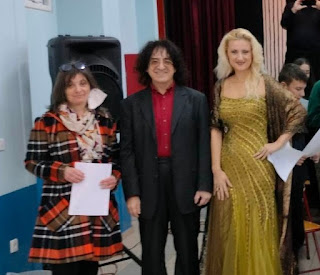
Monday, February 13. In the multi-purpose hall "Christos Tsevas" of the 5th Gymnasium of Acharnon, the opera "Iliad of Homer" by the composer Panagiotis Karousos was successfully presented under the direction of Music Professor Amerissa Ftoulis. The outstanding lyrical artists played the lead roles: Irini Konsta, Olga Skekliou, Giorgos Housakos, Rea Voudouri, Yannis Darreios, Niki Zaharopoulou, Argyris Kontonikolau, and Harry Giann on the piano, and the composer Panagiotis Karousos. The opera was presented under the auspices of the Hellenic-Eurasian association (Xenophon Lambrakis, president). The school's theater group led by Maria Tzei, the school's choir led by Amerissa Ftoulis, in the form of an Ancient Orchesis accompanied by a drum and a guitar, and musicians and opera actors led by Panagiotis Karousos, participated in the performance. The scenery was prepared by Neratzoula Efetzi and the director of the school, Mr. Karavias Spyros, addressed the greeting.
Students participated interactively in actions from texts of Homer's Iliad, Rhapsody A, Rhapsody G "Diomede and Glaucus", Rhapsody P "Patrocleia". The examples of prosody on phrases of the Iliad in the ancient text edited by the composer Panagiotis Karousos were interpreted by the soprano Rea Voudouri.
The students applauded their classmates and the artists. The participation of the students of the 5th High School of Acharnon was special, as well as their thorough preparation by their teachers.
The opera "Iliad" by Homer by Panagiotis Karousos is presented interactively in Schools as part of the educational program "NEW HOMERIDES" of the Ministry of Education of Greece. The program is aimed at student groups of Senior High Schools, General High Schools, Evening High Schools-High Schools and special schools from all over Greece with the aim of familiarizing young people with the art of lyrical singing and theater through their participation in an interactive opera performance.















































